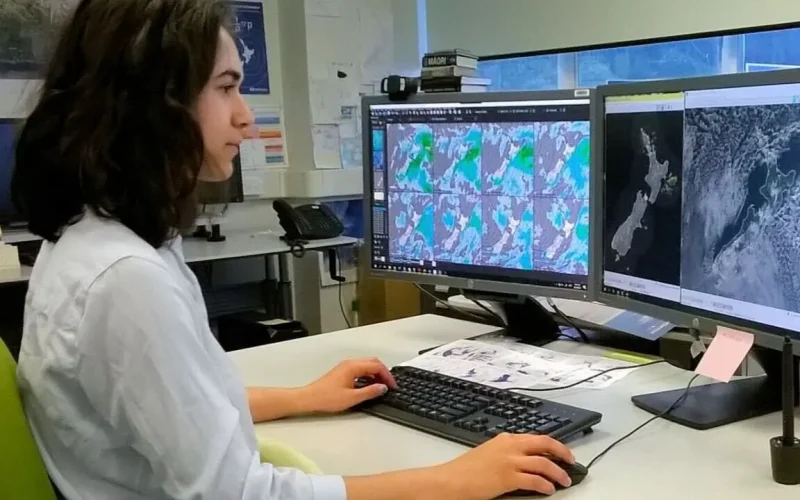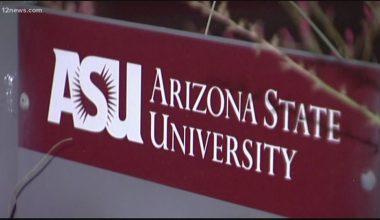You may be familiar with the old joke about weather forecasters; about how they are getting paid for ruining an event with a sudden downpour or an unreasonably hot day. But in reality, meteorologists are not wrong. Weather studies are incredibly complex and change frequently. That’s why attending any of these best meteorology colleges can get you started in your career.
Meteorology is one of the most difficult and important scientific fields. It’s not just because everyone likes to check the weather. Besides learning how to appear on television, Meteorological School students also grapple with the realities of climate change and human impact on the atmosphere.
Hence, atmospheric science is one of the most important scientific fields. They deal with events that will continue to affect our daily lives.
This is so important that good meteorology and atmospheric science programs require experienced faculty, resources, and facilities that keep up with the demands of the times.
In this writing, we shall discuss the best meteorology schools available for you to attend if you want to have a rewarding career in the field.
Table of contents
- What do meteorologists do?
- What are the requirements for meteorologists?
- Wh at are the best Meteorology Schools?
- #1. Cornell University (Ithaca, New York)
- #2. University of Miami (Coral Gables, Florida)
- #3. Ohio State University (Columbus, Ohio)
- #4. University of Wisconsin-Madison (Madison, Wisconsin)
- #5. University of Georgia (Athens, Georgia)
- #6. University of California, Davis (Davis, CA
- #7. University of California, San Diego (San Diego, California)
- #8. University of California, Berkeley (Berkeley, CA)
- #9. University of California, Los Angeles (Los Angeles, CA)
- #10. University of Michigan, Ann Arbor (Ann Arbor, Michigan)
- FAQs on the Best Meteorology Colleges
- Conclusion
What do meteorologists do?
A common misconception is that a meteorologist is someone who announces weather forecasts on television. However, there are only a few professional meteorologists on television.
Research, education, consulting, and forecasting are just a few of what meteorologists do. You can find jobs at public and private universities, private and public companies.
What are the requirements for meteorologists?
The entry requirement for a meteorologist is a bachelor’s degree in meteorology or atmospheric science, which usually takes four years to complete. Meteorology degree programs are available from a variety of educational institutions, including the top meteorological schools listed.
However, some schools offer degrees with a specialization in meteorology, while others offer degrees with specializations in broadcast meteorology or atmospheric science. Therefore, it is important to make an informed decision.
Apart from the required academic performance in meteorology, you can expect four semesters of analysis, two semesters of physics, and a course in chemistry in the first two years of study.
This is in addition to the required Meteorology coursework. During your junior and senior years, you will likely take most of your meteorology courses.
In addition, degrees that include minor or additional courses in computer hardware and software, communications, business administration, agriculture, geography, social sciences, chemistry, physics, or mathematics may be beneficial depending on post-university career paths.
Additionally, a good grade point average can be very helpful in finding a well-paying job. The majority of meteorologists hold a Bachelor of Science degree, but it is becoming increasingly common to also hold a Master’s degree or Doctor of Philosophy (Ph.D.) degree.
Earning one of these advanced degrees almost always increases your earning potential and opens the door to a variety of professional career paths. If you are interested in an academic career, you should be prepared for a Ph.D.
Related Post: 42 Gifts for Your College Brother: Surprise Him with Something He’ll Love
What are the best Meteorology Schools?
If you’re like most people, you probably spend a lot of time thinking about the weather. You may be lying on the floor staring up at the atmospheric ceiling.
Those who have decided to make this growing interest their career may wonder which schools offer the best programs in meteorology. This is true whether the interest is completely new or has been around for a long time.
Finding the best meteorology colleges can take a fair amount of research, but don’t worry, we’ve done the prep work beforehand.
Related Post: Certified Student Loans vs Uncertified Private Student Loan | All You Need to Know
#1. Cornell University (Ithaca, New York)
As the only Ivy League university on this list of best meteorology colleges and the only Ivy League school with an atmospheric sciences program, it’s no surprise that Cornell’s College of Agricultural and Life Sciences tops the list.
The school offers everything you would expect from a facility of this class, including access to resources such as the Northeast Regional Climate Center. Funded by the National Oceanic and Atmospheric Administration, the centre works with the National Climatic Data Center, the National Weather Service, and other organizations to record and monitor atmospheric changes in the Northeast.
Like other programs at Cornell University, this college major has small class sizes and offers unique opportunities to work closely with faculty. Students develop strong relationships with teachers and gain access to knowledge and research projects.
But don’t let this superior quality fool you. Cornell University’s Atmospheric Sciences program operates with the State University of New York system.
Because of this, the program’s tuition fees are much lower than Ivy League schools and on par with SUNY.
#2. University of Miami (Coral Gables, Florida)
The Department of Atmospheric Sciences at the University of Miami’s Rosenstein School of Oceanic and Atmospheric Sciences allows students to work at the field’s cutting edge.
Due to its location in an attractive climatic hotspot, the Rosenstein School offers students the opportunity to participate in exciting research projects.
These projects include an atmospheric chemistry group working to understand the role of gases and particles in changing air quality and climate.
Group participants will visit locations such as forests, urban centres, and high-latitude oceans to obtain readings and readings that will be used to analyze the effects of atmospheric chemistry on human health and climate.
Scientists participating in this program study cloud and aerosol processes, their interaction, and the effects of this interaction on radiation.
Through work at the Cloud-Aerosol Rain Observatory in southern Florida, these scientists are gaining a better understanding of how pollutants and smoke are changing air quality and climate.
#3. Ohio State University (Columbus, Ohio)
At Ohio State University, research in meteorology is more than just an academic subject. It’s also a lot of fun. The students’ passion is reflected in the activities of the weather club.
Clubs play an important role in keeping the program up to date. Years of club support have secured new resources for the department, such as data logging equipment and photovoltaic equipment systems. This material will allow students to explore weather changes more closely.
It’s smart, it’s fun, it’s innovative, and it’s the focus of the OSU program.
Related Post: Can You Play Two Sports in College? All You Need to Know
#4. University of Wisconsin-Madison (Madison, Wisconsin)
The Faculty of Atmospheric and Ocean Sciences boasts unparalleled excellence with its 18 faculty members with expertise in climate sciences, weather systems, and more.
Besides understanding the atmosphere and oceans and predicting the weather, students and educators are grappling with some of the most pressing problems of our time. Hence, why it ranks as one of the best meteorology colleges
Program participants study air chemistry and quality, solar and surface radiation, clouds and precipitation, and other phenomena that affect our quality of life.
Part of the school’s success is due to its efforts. The school was recently selected as a partner community for the American Geophysical Union’s Bridge Program. With these resources, programs can recruit and retain more members from underrepresented communities.
#5. University of Georgia (Athens, Georgia)
The Atmospheric Sciences major is a relatively new addition to the University of Georgia’s majors but has already established itself as one of the best majors in the country.
Building on the success of the previous Bachelor of Atmospheric Sciences, this new degree better meets the needs of employers in this field. Thanks to a new research focus and an expanded curriculum, this major now meets the standards of the American Weather Association.
As this change indicates, the new program is particularly suitable for those wishing to pursue a career in weather forecasting.
This degree meets the state requirements for civil service meteorology and the science course required to become a certified broadcast meteorologist.
Graduates of this program have held positions in areas such as emergency management, energy and utility industries, television broadcasting and the National Weather Service.
Related Post: 15 Things Teachers Actually Do During the Summer for Fun
#6. University of California, Davis (Davis, CA
The Atmospheric Sciences program is part of the Department of Land, Air, and Water Resources in the School of Agricultural and Environmental Sciences at the University of California, Davis. It is characterized by small class sizes and increased interaction among faculty.
Under the strict supervision of teachers and mentors, students make observations, use special equipment, deepen theory and create models.
Students in this program work closely with scientists from various faculties to find new avenues of research, thereby producing thoughtful and creative students.
These students’ work has been recognized by organizations such as the American Weather Society (AMS). An undergraduate researcher in this program received two of her six grants offered by AMS for research into climate change and its impact on ozone pollution.
Additionally, students have access to programs such as her Extreme Weather group at Davis University. Members of the group study extreme weather phenomena such as tropical and extratropical cyclones and atmospheric disturbances, looking for possible socio-economic damage caused by these events.
#7. University of California, San Diego (San Diego, California)
Like all meteorology colleges on this list, the Marine and Atmospheric Sciences Major at the University of California, San Diego, offers everything you need to become a professional. Students learn the fundamentals of oceans and atmospheres, including the chemistry and physics that govern them.
Students use specialized tools, including experts from the Scripps Institute of Oceanography. Students work closely with faculty and graduate students in small classes to advance their research themes.
But what makes UCSD great are the unique internship opportunities. Past examples include a position in the Open Spaces Division of the San Diego Department of Parks and Recreation.
Students can also act as campus organizers to support the university’s clean energy transition and increase student participation. As you can see from these programs, UCSD strongly emphasizes student leadership and education.
Related Post: 25 Best Religiously Affiliated Colleges in the World | 2024 Rankings
#8. University of California, Berkeley (Berkeley, CA)
At the University of California, Berkeley, students and faculty work at the Berkeley Atmospheric Science Center (BASC). As the research and education hub for atmospheric sciences at the University of California, Berkeley, BASC provides the division with cutting-edge technology and support.
BASC is just one of the main benefits of our school program. Meteorology students learn the fundamentals of the science of atmosphere, climate, and circulation dynamics.
This course will focus on topics such as changes in stratospheric ozone, the effects of smog, and the physics of climate change.
But all of this work lays the groundwork for the final project in which the student undertakes his own research. Students will have the opportunity to develop their interests and knowledge further using the extensive resources of UC Berkeley, including BASC while working closely with subject advisors and academic advisors.
#9. University of California, Los Angeles (Los Angeles, CA)
This is another best meteorology colleges on this list. The system has a unique take on meteorology, and the University of California, Los Angeles, may be at the forefront.
UCLA deserves this award because it understands the urgency of the problem. The school recognizes that climate change is an urgent issue and is uniquely positioned to educate the next generation to deal with it.
The program considers the diverse changes in climate and our natural habitats. Recognizing the role of human activity in the atmosphere, our teachers and students take a dynamic approach to this subject and strive to keep abreast of the latest developments.
Program participants work under leading experts in the field, including Professor Rong Fu. Prof. Fu was recently awarded the American Weather Association’s Award for Excellence in Biometeorology.
He spent years studying feedback mechanisms in the tropical biosphere and mentoring the next generation of experts.
Related Post: 21 Affordable Braces for College Students: Achieve a Perfect Smile on a Budget
#10. University of Michigan, Ann Arbor (Ann Arbor, Michigan)
“Science-driven engineering at its best” This is how the University of Michigan in Ann Arbor advertises its climate and space science department. It’s a bold claim, but the company backs it up with an excellent weather program.
Since 1954, the program has put research first, educating students in science fundamentals while promoting innovation that reflects the latest knowledge. Today, the school continues this precious history as one of the best meteorology colleges.
Major projects include theory and modelling work on developing methods to track ocean waves and currents and the impact of naturally occurring and artificial aerosols on climate.
Faculty and student bodies work together to study air quality and lower atmospheric chemistry. Together, they are designing new instruments and chemical chains to record climate change.
FAQs on the Best Meteorology Colleges
Bachelor of Science degree, Master’s Degree, or Doctor of Philosophy (Ph. D.)
Cornell University in Ithaca
Most meteorology jobs are low-stress. Certain aspects of the job can put a strain on your family and social life.
weather radar
Conclusion
Studying atmospheric science and meteorology is a worthwhile option and usually an important first step for students who want to start a career as a meteorologist, atmospheric scientist, or climate scientist.
The best school, objectively, is not necessarily the “best” school for all students. There may be many other perspectives to consider when choosing a college. Features such as campus amenities, transportation services, and dining will undoubtedly influence which university you want to attend.
References
- collegegazette.com -Best Meteorology schools in the us
- admissionsight.com -Best Meteorology schools in the united states
- authority.org/rankings -best colleges for atmospheric sciences and meteorology



